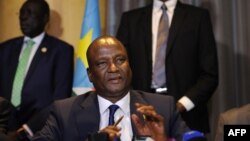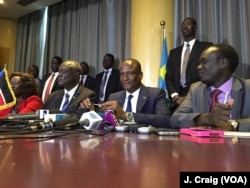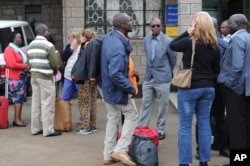South Sudan’s new First Vice President Taban Deng Gai is asserting his country is “peaceful and quiet” and moving ahead with reforms following clashes in the capital that killed some 300 people last month.
Deng spoke to journalists in Nairobi Wednesday while in town to meet with Kenya’s President Uhuru Kenyatta. He accused reporters of falsely reporting that fighting continues in Juba and elsewhere.
“This is not true. This is not true,” said Deng. “The country is in peace; it is quiet in the whole region of Upper Nile. There is no fighting in all the areas of Upper Nile, where I had come from. The crisis that had happened in Wau, arrested redress. There’s peace in Wau now. No fighting at all, around Juba. If there are any skirmishes, it should be somewhere west, somewhere west of the country, in the borders of DRC. Especially the areas of Western Equatoria region.”
Tenuous cease-fire
A tenuous cease-fire has been holding in Juba since the July violence, but there have been sporadic reports of continued fighting around the Equatoria region and former Western Bahr el-Ghazal State between forces who back President Salva Kiir and those backing his opponent Riek Machar.
Deng said the government has prioritized combining the two forces, with the goal of having one fully united army by May 2017.
“Parallel armies is what brought crisis last month,” said Deng. “That led to the killing in Juba, and that led to the former first vice-president moving away from Juba.”
When Machar left Juba, Deng was installed in his place, a move that some opposition members rejected as illegal. Deng says his appointment is in line with the terms of the peace agreement.
Machar's future
Deng suggested that Machar, “wherever he is,” should ask for peaceful passage to a location of his choice in either South Sudan or another African country, where he should organize his political party and wait for the 2018 elections.
But Deng was unclear about what he would do if Machar turned up, looking for his old job back.
“My comrades in the SPLM opposition decided to put me in the position, I gladly accepted this. I’m also telling you, if my stepping down can bring peace to South Sudan, I’m ready when time comes. But what I’m doing now is that I’m not delaying implementation of peace, waiting for anybody,” Deng said.
Deng said he was not aware of recent allegations of violence targeting American aid workers, as well as the murder of a local journalist at a hotel compound in Juba in July.
“I’ve not come up, across a report, alleging rapes against foreign aid workers but I know there’s a lot of allegations of South Sudanese woman and girl went through rapes. What we have done, the government have formed committees, to do the investigation, and for your information, the army have instituted a court martial body, because these claims against rapes and human rights violations are serious issues. And in Wau, a number of soldiers have already been punished and capital punishment was applied.”
Witnesses said it took many hours for South Sudanese security forces to respond to calls for help from those inside the compound. When asked about the incident, Deng said delays are inevitable, no matter where you are.
“You know, even in United States... even in your country, the police and army come late. It is not automatic,” said Deng.
Deng also urged regional bloc IGAD to have technical staff visit Juba and work with his government on the specifics of deploying a 4,000-person regional protection force, recently approved by the African Union.






